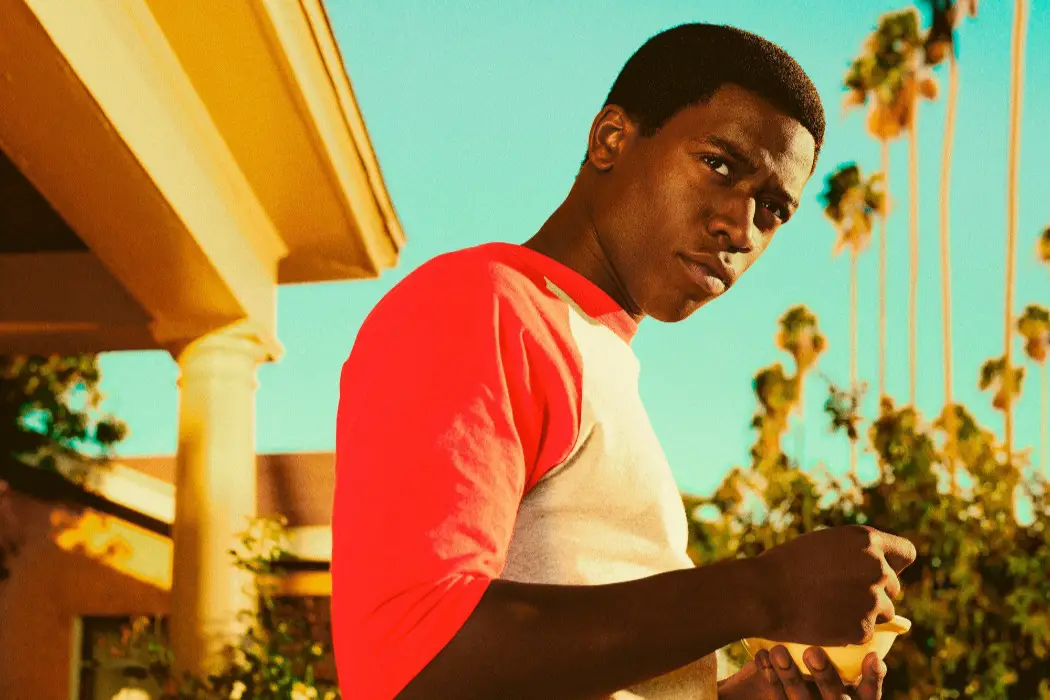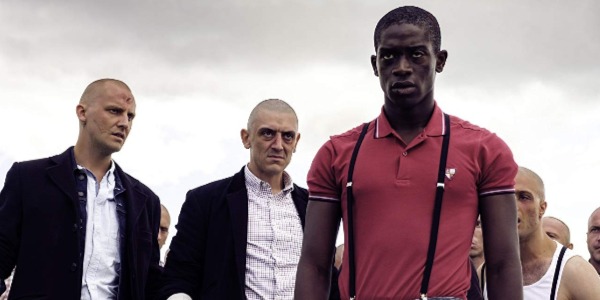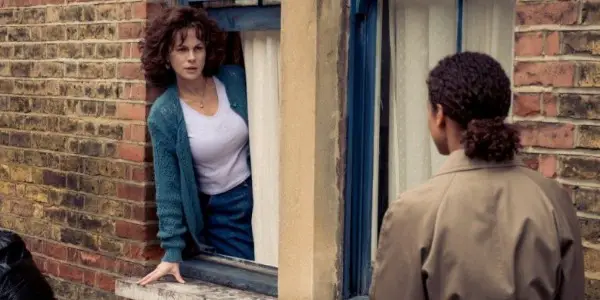Interview With Damson Idris, Star Of FARMING

Alex is a 28 year-old West Australian who has a…
Adewale Akinnuoye-Agbaje’s directing debut Farming is quite the confronting experience; foremost, it is another film this year that, akin to Mike Leigh’s Peterloo or Gavin Hood’s Official Secrets, brings forward a painful chapter in British history. Farming recalls the titular practice where, in the brief period between the 1960’s and 70’s, Nigerian parents would pay white British families to raise their children whilst they accrued careers, degrees or any form of stability that could guarantee their fostered offspring a better future.
A victim of this flawed procedure is Eni (Damson Idris), a stand-in for Adewale Akinnuoye-Agbaje’s own turbulent youthful participation with farming, whose displaced upbringing psychologically lead to a rejection of his own Nigerian heritage, a denial that cascades into the absurd situation of the black teenager joining – and ultimately becoming the leader of – a feral gang of young skinheads. The process of hate-filled neo-Nazis uniting with their fundamental enemy is no easy (or pleasant) experience, and each step in Eni’s despondent descent adds up to a portrait of a scared, confused teenager whose longing for a sustainable sense of acceptance only furthers any real dependable chance to do so.
If 2019 is to be the year where the medium of film allows artists to nakedly record their own painful histories in candid details – Pain and Glory, Tommaso, The Souvenir and The Farewell immediately come to mind – then Farming is another fascinating entry into this emerging sub-genre, with The Irishman and Honey Boy soon to follow. In time for its upcoming Australian theatrical release, I had the chance to talk with the film’s star, Damson Idris, about inhibiting his character’s dogged intensity, how method he went with the role and how having Akinnuoye-Agbaje on-set as both a director and actor helped sell Farming’s authenticity.
Alex Lines for Film Inquiry: Can you talk about how you got involved with Farming?
Damson Idris: I was working on my show Snowfall and one of the leading producers on Farming, Michael London, on the first day of Snowfall was like, “Hey, there’s this project in London, seems to be great.” And I was just like, “Yeah, whatever. Great.” So when I finally got to London, I met up with Adewale – Mike helped set that up – and he told me about his story, and I was instantly distraught, intrigued and anxious to get involved in the process right then. It’s actually interesting, I am Nigerian, yet had no idea about farming.

Were you aware of the practice of “farming” before reading the script?
Damson Idris: I definitely didn’t know what it was called. The funny story is, I remember asking my mum, “Mum, what is this? Did anyone you know had this happen to them?” She was like, “It happened to a couple of my friends’ kids and stuff like that.” And then right when I wrapped the movie, I talked to my sister and she’s like, “Oh, yeah, mum sent me to stay with a family in Grays for a year.” I was like, “Oh, thank you for telling me. Thank you for telling me now. That would’ve been helpful” [laughs]. Yeah, but it really is something that was a global issue and it’s a piece of British history that a lot of people don’t know about.
How was it to work with Adewale as both an actor and a director?
Damson Idris: Oh, I instantly trusted him, because he was an actor. So, he knew the places I need to get to, the darkness I need to be involved in. One plan, such a character. He knew that that’s the process. He knew that every actor has their own rituals, and that created a strong bond between us. We were able to tap into emotional memories that no one else from set knew about. We were able to use that to our advantage. More specifically, my relationship with my dad was something we used in order to get into some of those emotional states, which I show in the movie. We were able to create that bond, and above all things, Adewale, this is his baby, and he’s been working on this script for 16 years by the time we shot.
This is quite a silent, but intense performance, your character deliberately not given many actual dialogue lines, a lot is said, but never spoken. What were the challenges of delivering a performance like this?
Damson Idris: Well, as an actor, that’s my favorite thing about movies is the silent moments. And that’s something I was really interested in. I think Eni probably speaks about 10 times during the movie. So it was important to me, although I wasn’t speaking, to be constantly showing a lens for the audience. The audience don’t speak to us, so I wanted Eni to be the audience.
I wanted Eni to be in situations that the audience can relate to. And I wanted him to show the audience exactly what this world was. His reactions to everything that’s happening around him almost plant the audience in his mind, so that they’re able to go on this journey with them and really relate to what he’s going through, so that they too could walk out of the movie, and be different and have a different mindset on race and culture, and identity and love.
I understand that you went quite method in your role, going to Tilbury, having the cast hurl abuse at you, going through some real torment etc. Do you feel this enhanced your performance?
Damson Idris: 100%. I feel the more stuff I could do and the more rituals I could be involved in, the more I could feel embodied by the character. I can sort of really walking in Adewale’s shoes. I told the rest of the cast to constantly be mean to me so from the beginning, they always wanted to apologize after every scene, but then I said, “Oh, this isn’t going to help me.”
I need you to be mean to me on and off camera. Throughout filming, we never meet up, we never got a drink. That relationship really was settled in from the very beginning, because I knew it would be important. I think I’ve eaten three apples a day, because I wanted to feel that that hunger and frustration Eni feels and also it was important to look skinny as hell. I isolated myself on set, I didn’t talk to anyone. I looked in the mirror constantly in my trailer. I tormented myself so I could really understand self-hate, and understand what this character is going through.
Any issues handling the snake? [John Dagleish’s skinhead character Levi owns a snake, which is eventually adopted by Eni]
Damson Idris: Ah, my Petal. She was amazing to watch, and actually we’ve created a bond that no one else could break, that’s why I had to handle her too. She wasn’t as nice with John Dagleish. She was better with me. There was actually a scene where me and the snake where I felt like we were one, because as the camera came in for the closeup, she attacked the camera, she wanted to protect me. In that moment I knew instantly that I was living in this character’s shoes. Put the snake one on Damson however, it might be a different story.

You share quite a number of intense exchanges with John Dagleish, how was that collaboration on set?
Damson Idris: John Dagleish is fantastic. And I can’t wait to see what his career grows to through this movie’s release. His intensity, his focus and his respect for character interaction was just perfection. He’s such a nice person. But he really respected that me and him couldn’t be friends. And after we hit it off the strongest, because we couldn’t wait to wrap, so we can give each other a hug, because the things we do to each other, it truly is remarkable.
To work with someone like that was a blessing. We were constantly pushing each other, taking it further and bringing stuff that wasn’t particularly on the page onto the screen. I can’t wait for people to see that relationship. It really was a father-son relationship, and he has nothing at home, and he’s longing to be accepted and he unfortunately seeks that in Levi. John Dagleish was amazing in doing that with.
I feel like there’s a tricky balance between playing a character who does bad things versus a person who is a bad guy so to speak, do you feel that the script found that balance for your role?
Damson Idris: Yeah, 100%. I feel to Eni the important thing was that the audience root for him even when he’s doing these bad things. And those are the characters I like playing. I believe once you wish bad on a character that’s when the audience should actually walk out. My job to keep them on those seats. And I think Eni does that. Even when he’s doing these bad things, you can see through his eyes that he doesn’t want to. And you see that it’s his lust for acceptance. And his lack of love and his constant pressure of self-hate is what’s causing him to do these things, but the audience relates to that.
This film played at Toronto Film Festival last year, and is now finally rolling out to European and Australian markets, so far, from your perspective, how has the response been?
Damson Idris: Well, it really is interesting, the cultural acceptance of the movie, because I won best performance, and the film won best film at Edinburgh Film Festival. But Toronto didn’t necessarily take to it, because I believe they didn’t understand it. And I almost feel that’s across the board.
I feel it’s very important for people who have a relation with it, the cultural piece of art to be the ones that justify whether it’s good or bad from the beginning. And then that kind of filters through the rest of society. I could never say a movie in Brazil, which is completely Portuguese, is the worst movie I ever saw. I believe is it’s up to the Brazilians to comment on it first, and then I could then interpret it through their eyes and better understand it. And that’s what Farming is. I feel this British industry going to relate to it completely. I feel people who have experienced genocide are going to relate to it. And then I believe then the rest of the culture are going to kind of jump on the train afterwards.
You’ve had quite the busy year, between this, Twilight Zone and Black Mirror, so what are you working on next?
Damson Idris: Currently, I’m working with Anthony Mackie, we’re in Budapest doing a movie directed by Mikael Håfström called Outside the Wire. I play a drone pilot, who’s thrust on the front lines and he really is understanding what war is. And you see firsthand how different it is to fly in the sky and drop a bomb then to actually work as a soldier. It’s a very emotional story that’s also really fun. I can’t wait for people to see it.
Film Inquiry thanks Damson Idris for taking the time to talk with us.
Farming will be screening at the Mini British Film Festival across Australia from 29 October to 24 November. Session times can be found here: https://britishfilmfestival.com.au/films/farming
The full theatrical release for Farming in Australia is 21st November.
Does content like this matter to you?
Become a Member and support film journalism. Unlock access to all of Film Inquiry`s great articles. Join a community of like-minded readers who are passionate about cinema - get access to our private members Network, give back to independent filmmakers, and more.












